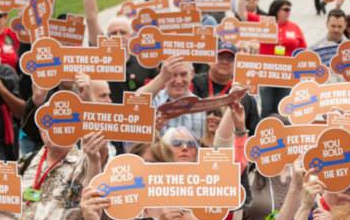 A Housing Co-operative is a group of people who form a corporation to provide housing services for themselves.
A Housing Co-operative is a group of people who form a corporation to provide housing services for themselves.
Co-op living is unique to all other forms of housing because it represents a community living within a community.
Democratic management is the lifeblood of a healthy co-op and the people who live in the Co-op, and who collectively own and operate the housing, are voting members. The members elect a Board of Directors from among themselves and authorize the Board to conduct the day to day business of the Co-operative in a manner that satisfies all of the requirements of the Co-operative Association Act and Regulations of BC and other governing documents of the Co-op.
All members in a cooperative share in the advantages and responsibilities of co-op life, which makes it more than just a place to live. “Participation and Volunteerism” is a vital component and contributes to the advantages of living in a co-op.
There are many kinds of co-operatives: food co-ops, co-op daycares, credit unions, retail co-ops, worker co-ops and housing co-ops. Any group of people can form a co-operative. The members own the co-operative and the co-operative provides a service they need. Housing co-operatives provide housing.
As a co-op member, you have security of tenure. This means that you can live in your home for as long as you wish if you follow the rules of the co-op and pay your pad assessment. As a co-op member, you have a say in decisions that affect your home. You and your neighbours own your homes co-operatively. Members form a community that works together to manage the co-op. Co-op communities are made up of all kinds of people – people with different backgrounds and incomes and special needs. These diverse and vibrant communities are the unique strength of the co-op housing movement.



